The Coronavirus: 14 Lessons From Asia
We just returned to the US from a 6 week trip in Asia, mainly in Singapore and Malaysia. While we were there, the coronavirus (now called COVID-19) emerged. For a while, Singapore had the second most cases after China and there was much concern about community spread. It was unnerving to be close to the epicenter of a new virus. Coronavirus has now spread all over the world. In the Coronavirus: 14 Lessons From Asia, we share our strategies for navigating the crisis.
What is COVID-19 (The Coronavirus)?
COVID-19, also known as the novel coronavirus, emerged as a new disease sometime in January. It is widely reported to have appeared first in a wet market in Wuhan, China. Many people believe that the virus jumped from bats to another animal, possibly an endangered species called the pangolin, and then into humans.
The Coronavirus is a type of virus that includes the common cold, SARS, COVID-19 and other diseases.
COVID-19 causes fever, sore throat, pneumonia and sometimes systemwide inflammation. It is reported that 80% of those infected only have mild symptoms. The elderly and those with underlying conditions are much more susceptible to having a serious case of the disease.
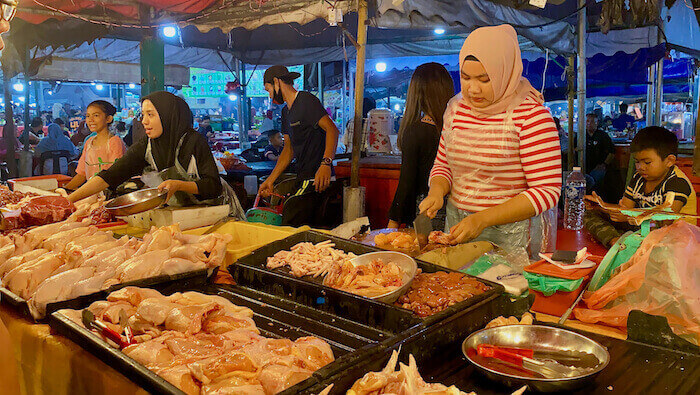
What is a Wet Market?
Wet markets exist throughout Asia and are places where locals purchase produce, meat, eggs, chicken, and fish. They are all over the place in Singapore, Hong Kong, China and southeast Asia. In some of the markets, as was the case in Wuhan, live wild animals are also sold.
Coronavirus (COVID-19) Timeline in China and Singapore
The timing of the virus’ emergence was unfortunate. Chinese New Year is the largest travel holiday in the world—approximately 3 billion trips are made. The first coronavirus cases were diagnosed at the end of December, but the world did not learn of the new disease until mid-January.
Wuhan was under quarantine by January 23—only 2 days before the start of the Chinese New Year. Most people had already left for the holiday, including an estimated 5 million Wuhan residents (5,000 were already in Singapore). The first case in Singapore was discovered on January 23, with community transmission reported shortly thereafter.
We arrived in Singapore on January 13. As soon as we got over our jetlag, we began hearing about the coronavirus. Singaporeans were calm, but very concerned.
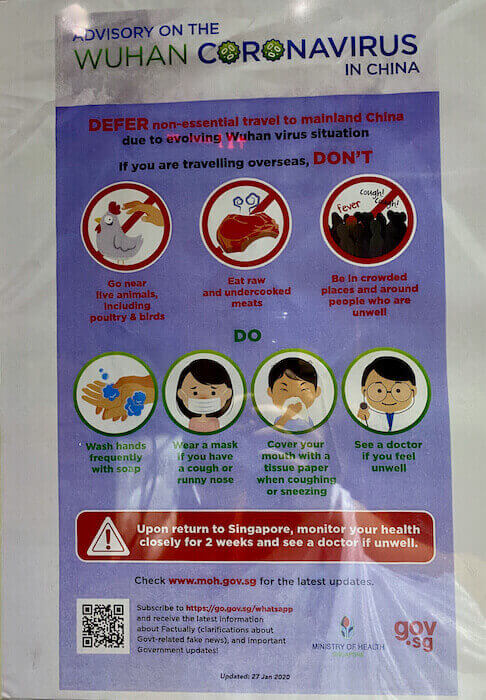
This article may contain affiliate links. This means that if you make a purchase after clicking on the link, we may receive a small commission. There is no additional cost to you.
The Coronavirus: 14 Lessons From Asia
We learned a lot being in Singapore and Malaysia during the beginnings of the epidemic. Since then, the coronavirus has traveled around the world and will continue to do so. Singapore’s public health team seems to have been able to contain the virus through a strong effort of contact tracing and isolation, but other countries and cities have been unable to do so. Here’s some of what we learned.
Become Comfortable with Non-Knowing
The coronavirus is new and there is a lot that we do not know about it. Some things we may never know. The headlines, tweets, posts and reports on TV can cause a great deal of anxiety. Much of this is speculation.
Where did it come from? How soon will it become a pandemic? Will it spread through Europe? The U.S? The Middle East? Africa? What’s the death rate? Will you get it?
Frankly, how it will affect the world and, you personally, is unknowable. Reading every article and post is not going to give you the answers.
What can you do?
Well, we decided to live our lives with the fear, make the best decisions that we could, spend time with friends and family and accept that there was much that was out of our hands. We also had some laughs, good food and conversation.
One of the laughs we had was this parody by Hong Kong singer Kathy Mackattack. It made the rounds in Singapore and probably elsewhere.
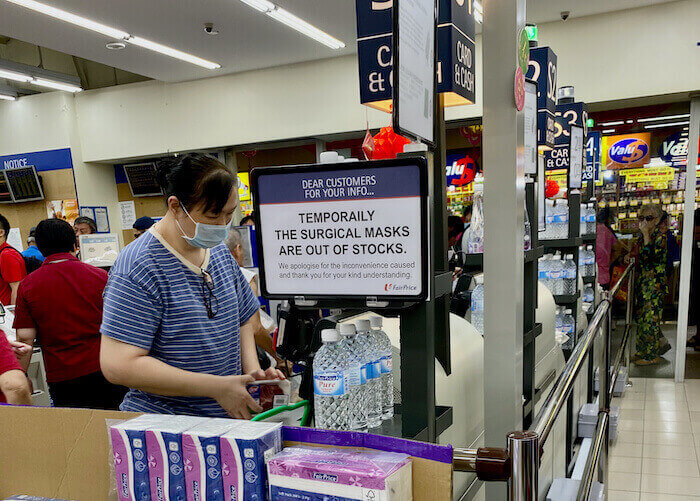
Follow The News But Don’t Get Obsessed
While we were in Asia, Sue would read articles every morning in the Asian Press (The Straits Times, China Daily), on Facebook, Twitter and other social media to find out what was happening in China and Asia. Then at night, she’d check the New York Times, CDC and other sources to learn what was happening in the US and Europe.
It was too much information. And, was definitely part of the search for knowing at a point when much is not knowable. She had to ease up on the reading.
Don’t Believe Everything You Read Or Hear
The coronavirus was the main topic of conversation everywhere we went. Rumors were all over the place in Singapore. People avoided certain places—some because the government shut them to sanitize and others just based on rumors. At one point, there was a run on toilet paper and instant noodles in the markets.
We get it. People don’t trust the government and that, in many places, is well-founded. Find some sources that you do trust. You might look at the CDC, WHO, or your own country’s health department. Sue was impressed by Singapore’s efforts and their transparency. Share your fears and concerns with others. Take a deep breath and let go of the panic. Talk to people and build community.
Ok, so we’ve talked about not knowing and what you shouldn’t do. What can you do?
Be Healthy—Exercise, Sleep Well and Eat Healthy
The stronger and healthier you are, the better. Get enough rest (skipping the late night reading of the latest coronavirus development could help). Exercise and eat healthy. The stronger and healthier you are, the better. You have more control over your own health that you do about the trajectory of the coronavirus.
Get Your Vaccines
Everyone keeps saying that the flu kills more people and that you should get your flu vaccine. Right now, we are near the end of the flu season so it’s too late to get the vaccine. Make sure you do so next year. While you are at it, get up-to-date on all of your other vaccines—shingles, pneumonia, hepatitis, etc.
Wash Your Hands
All of the public health experts say that washing your hands is the best protection. And, we never washed our hands more often than we did in Singapore and Malaysia. We also carried hand sanitizer with us and used it regularly (though we could have been better with that). Our hands became very, very dry. Carry some lotion around too. The other advice we heard was to refrain from touching our face, eyes, nose, etc. That was harder for us to remember.
To Mask or Not To Mask?
The Singapore government gave out 4 masks to every household in Singapore. At the point that they gave them out, masks and hand sanitizer were sold out everywhere. They did it to instill confidence in the population, to stop the stockpiling of masks and for other reasons.
Contrary to popular belief, masks are not protective for healthy people to prevent illness—most are too porous, are not worn consistently/properly or in the right way. They are best used by people who are sick to prevent transmission to others. In this way, the Singapore government was smart.
That said, we decided to wear masks when we were traveling in the airport and on the planes, especially if there was someone coughing near us. It also helped us remember not to touch our faces. And, we wore them when we were sick. More on that later.
If wearing a mask makes you feel more comfortable, then do it. But don’t hoard masks, sanitizer or instant noodles. It is most important that healthcare workers have masks.
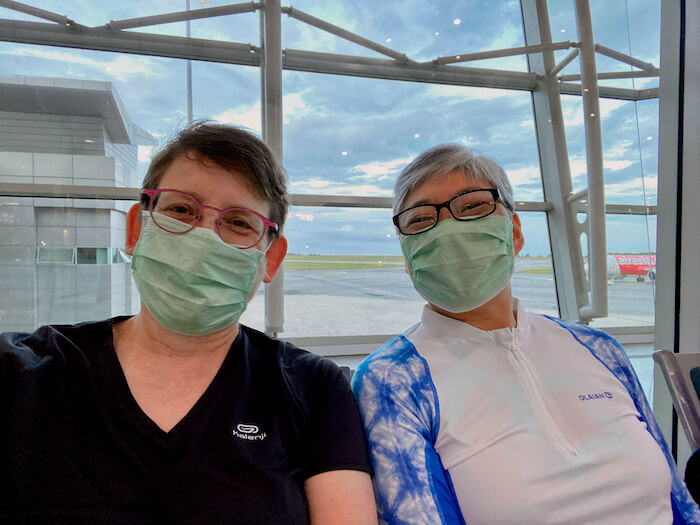
Dealing With Illness
We both got sick while we were in Singapore and Malaysia. It was scary. The scariest moment was when Sue ran a fever of 101.5°F (38.6°C). We almost went to the hospital. Fortunately, the fever broke quickly.
But, just because you get sick does not mean you have the COVID-19. A cold is a cold. A sore throat and a fever can be just that or more serious. We stayed at home and wore masks when we were not feeling well.
Follow the advice of your public health department if you do get sick. Many already have hotlines set up to call. Some healthcare facilities prefer a call first (before walking in) if the symptoms are similar to the coronavirus.
Travel Decisions
Making decisions about travel in Asia was something we thought about seriously. Our original plan was to go to Myanmar for a week in mid-February. Myanmar has very extensive relationships with China and shares a long and porous border. It also does not have a very good health system.
At that point, Myanmar was reporting no cases of the coronavirus (A month later, it’s still reporting no cases). We did not have faith in that assessment.
After much discussion, we decided not to go to Myanmar. We simply did not feel safe going there. Instead, we went to Malaysia—Kota Kinabalu and Borneo. Malaysia has a much better healthcare system and Borneo was a remote destination. We made the decision that we felt most comfortable with. Others may have made a different decision.
There are many more issues arising now as the virus spreads through countries and on cruise ships. Flight cancellations, events postponed, sites being closed and public gatherings being limited. We were relieved to make it back to Singapore after Borneo and even more relieved to be back in the US.
Flying Safely—Cleaning Your Seat Area
The coronavirus made us think about flying differently. First off, the air filtering in airplanes is very good. You don’t really need to worry about the air unless you are seated near someone who is coughing or sneezing. The rule of thumb is that a virus can travel 6 feet or 2 meters in a cough or sneeze.
Seat pockets, seat belts, tray tables—these are the things we worried about. We brought sanitizing wipes to wipe down everything. And, we didn’t use the seat pockets at all. We also decided that we would request different seats if there was someone sick near us.
Make Your Best Decisions and Live Your Life
After deciding where to go and what to do, the rest is living your life. There are risks everywhere. That’s not to minimize the scariness of the coronavirus (COVID-19), but more to say that living and laughing and talking is a part of being in the world together. We had some laughs about the virus and living in Singapore. Share your concerns and create community with them.
Let Go of the Blame Game
We frequently heard people in Singapore talk about “keeping the Chinese out” or other statements blaming the Chinese. We are sure these kinds of conversations are happening all over the world. Many countries have closed borders, refused cruise ships, etc. That strategy has clearly been unsuccessful from a public health, political and moral perspective.
We think there were certainly errors made by the Chinese government. The people, however, are going through a very rough time. They need support and community. As will every country that experiences the pandemic. Closing our hearts and minds will not protect us from the virus or from future challenges that we face.
Navigating Rules about Quarantines
Given the spread of COVID-19, people with travel plans have to grapple with whether or not to travel, the possibility of quarantines and cancellations of trips and public events. We need to respect the health situation and decisions made by the authorities in each country.
While we were in Borneo, Sarawak (a neighboring part of the island of Borneo) decided to institute a 14-day quarantine for all travelers coming from Singapore. Sabah, where we were, is on the other side of the island and we arrived before the new policy. Our re-entry into Singapore from Borneo concerned us. We didn’t have 14 days before our return flight to the US so if we were quarantined, it would have meant changing flights and a lot of other problems. It turned out not to be an issue. There was temperature screening at Changi airport, but nothing more intensive.
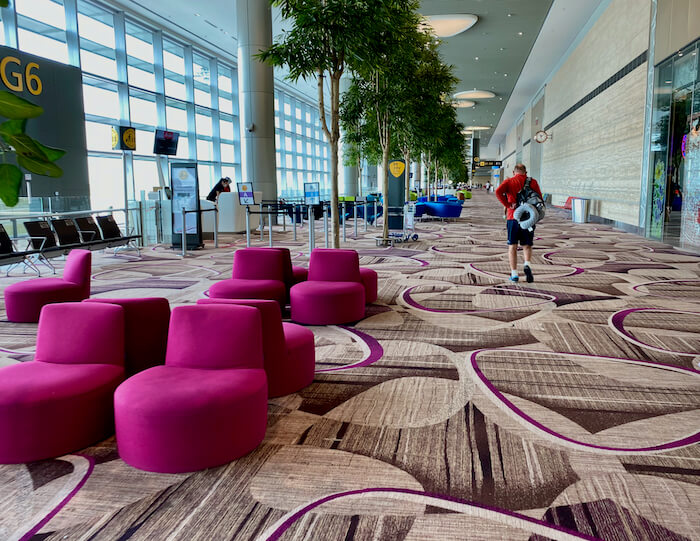
Returning to the US was very lax. We were asked at check in if we had been to China. That was it. There were no other indications of concern about COVID-19. That will likely change in the coming months.
When we came back to the US, we decided to stay at home for 2 weeks and to refrain from visiting elderly relatives and friends. We didn’t feel that was required but felt more comfortable making the decision.
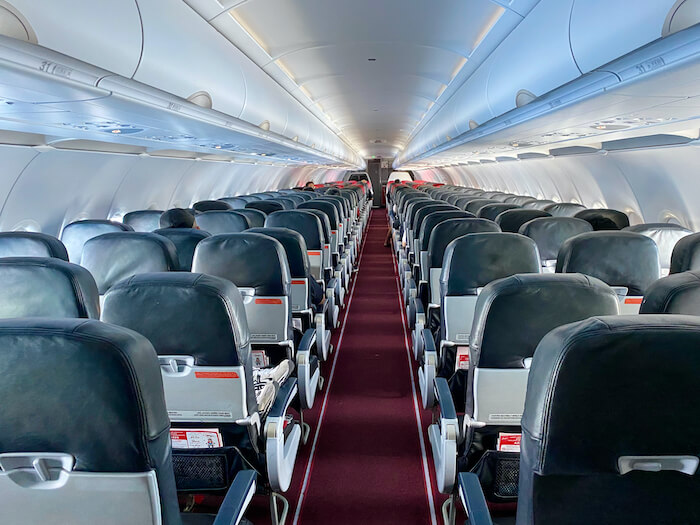
We are One World
We are always amazed when we get on a plane in Singapore and arrive 18 hours later In NYC on the other side of the world. Within a month, a virus can travel to dozens of countries. Hundreds of thousands of people’s lives can be affected. However large we feel the world is, it is also small and connected. Our common humanity can also be felt around the world in an instant. Our hope is that we keep creating with that.
We hope that this is a helpful addition to the conversation and would love to hear your thoughts and responses.
How Are You Dealing With The Coronavirus (COVID-19)?
Please Pin and Share
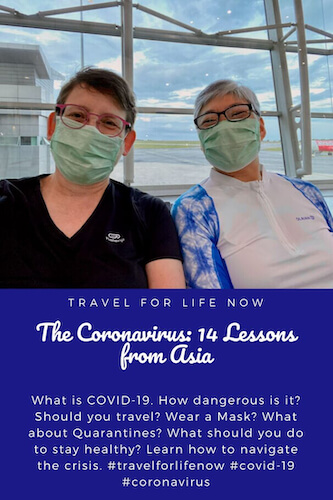
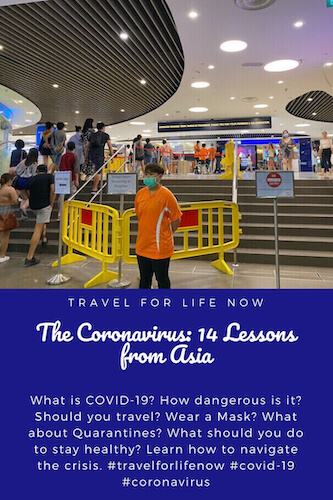
Travel for Life Now is a participant in the Amazon Services LLC Associates Program, an affiliate advertising program designed to provide a means for sites to earn advertising fees by advertising and linking to amazon.com. Amazon and the Amazon logo are trademarks of Amazon.com, Inc. or its affiliates.
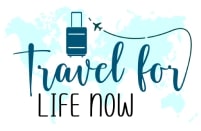
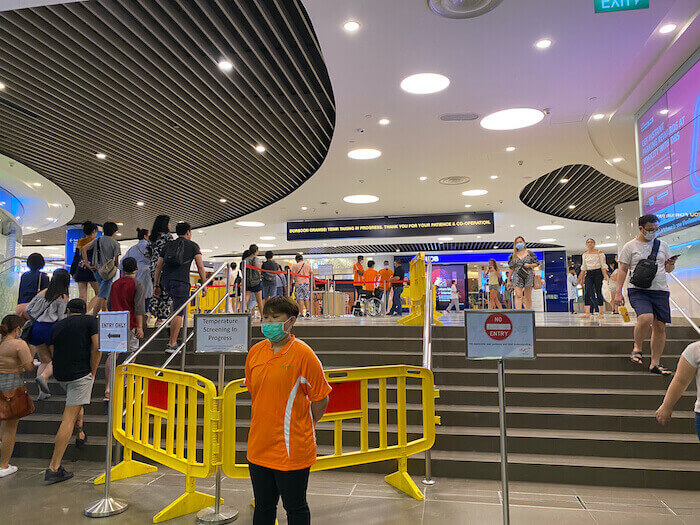
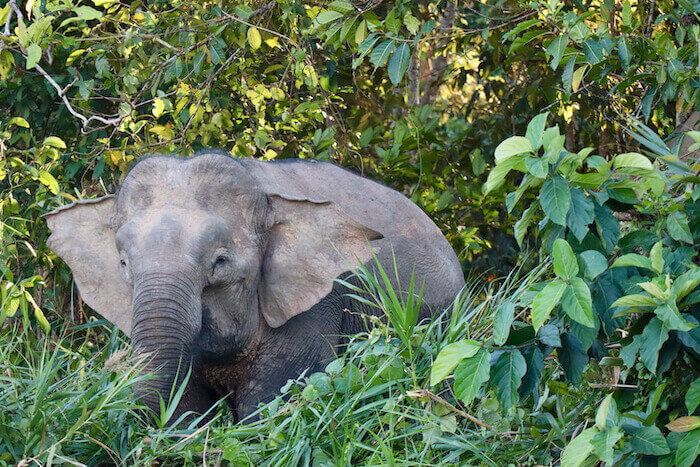
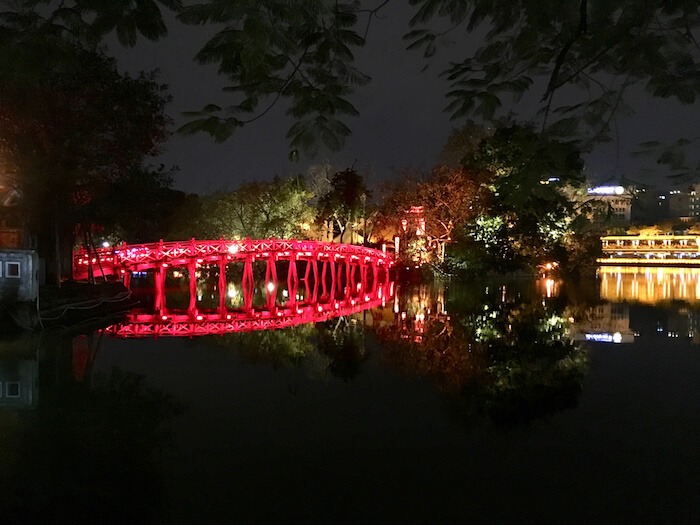
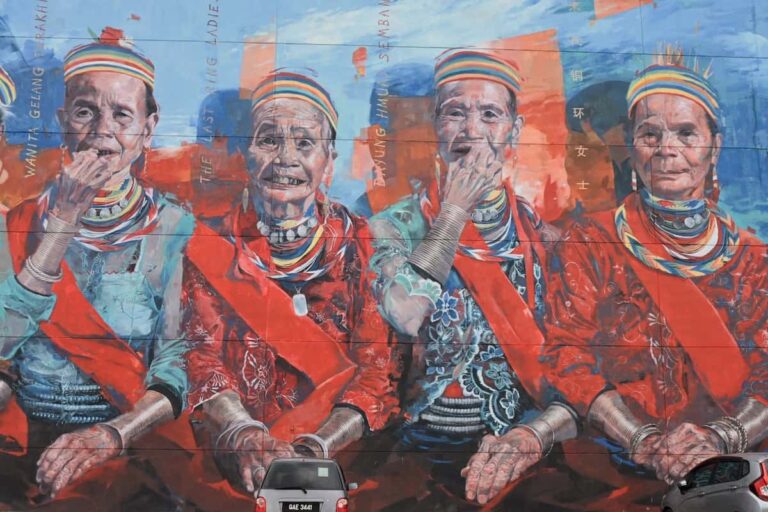
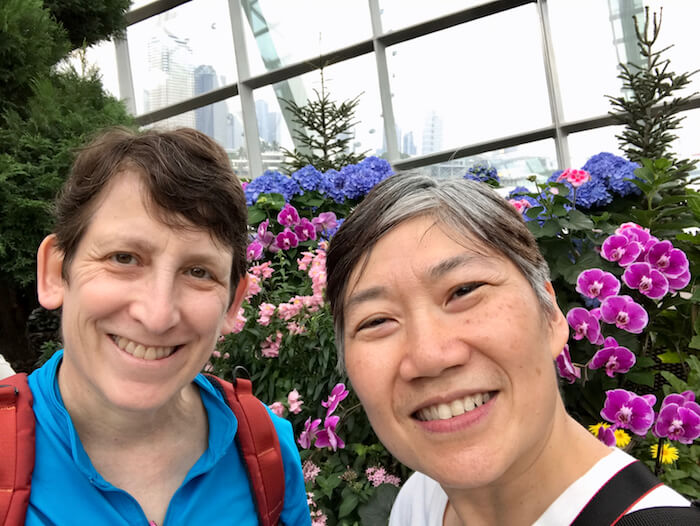
We are traveling in Africa now and headed to Europe. I’ve never washed my hands so much, but what a great lesson that is. Thanks for a great article.
Laureen,
Glad you found the article helpful. And, I’ve never washed my hands as much too! I’m starting to carry a small bottle of lotion everywhere.
Sue
Thank you for this Sue. I welcome your honesty and level-headedness. I read it with interest as we travel to Europe next week – we’ll be staying for a few months – so I’m trying to prepare and buy things that we may need here, rather than come up against a language barrier there. Common sense and hand washing are my go to’s right now!
Nicky-
Thanks. Good idea to buy what you need before you go. Hand sanitizer was sold out in a lot of places that we were. Luckily we had brought a lot with us from the US. Common sense and level-headedness are important right now. And, handwashing!
Sue
This is an absolutely superb post on a subject that is affecting the world. It was so interesting to read about your experiences and at one point when you said you got sick I was fearful that the post was going to turn more sombre. Glad to hear that Sue recovered quickly, I wonder was this the virus or a travellers cold? I would have convinced myself that I had caught the dreaded virus so it was good to read that you took it in your stride. The photos of the empty plane and airport make a real impact and show scenes that we are not seeing on the news. Thanks for your insiders view of this virus and let us hope at some point it will stop spreading and the world can return to normal.
Angie,
Thanks for your comments and glad that you found the post helpful. It is a challenging time and pretty scary. I don’t really know what illness I had. It wasn’t a cold. It included some of the coronavirus symptoms (fever and sore throat) but no cough. We were prepared to go to the hospital, but it cleared up. And, we were very thankful for that.
Sue
I found this post very useful and informative. Thank you. We’ve just cancelled a big trip to Australia as our flights were with Air China with a 4 day layover in Beijing. Bad timing!
Suzanne,
Glad this was helpful and sorry to hear about your canceled trip. Lot’s of flexibility needed right now.
Sue
We have been sitting smugly in NZ on a tiny island in the middle of nowhere with no sign of the virus – until yesterday. The first case has arrived here from a citizen returning from Iran. Yes Sue and Reggie the world is a small place.
We are wondering whether or not to delay returning to Europe and to our motorhome located in France. I think you are right about living your life but still we need to make sensible decisions that we can live with.
Thanks for sharing this insight and stay safe.
Ruth,
It is a challenging moment and these decisions are hard to make. Living your life and making sensible decisions is a good way to put it. Sometimes all we can do is do the thing we feel the least uncomfortable with. Stay safe–whatever continent you decide to be on.
Sue
This is such a common sense approach to the whole virus. I watch the news and I feel they are scare mongering. Doom and gloom. I do need to be extra careful as I am immune suppressed as I take chemo drugs which I may stop before I travel end of June/July. I already take a lot of precautions but will add a few more. Unfortunately my travel insurance won’t cover me If i cancel the trip, if a doctor tells me I can’t go or smart travel by the government here in Australia say to NO to travel then I might. We are flying via Singapore to Europe. Have shared.xx
Bree,
Take good care during your travels. immune suppression can have a big impact–though you know that better than me. Travel insurance is tricky and often doesn’t come into play when we most need it.
Sue
Really good background and advice about how to think about this virus. We’re just starting to see community spread here in the US, but so far there aren’t any reported cases where I live.
Sage,
Thanks and glad you found it helpful. We’re back in the US now too in the NYC area. I’m afraid it’s only a matter of time…
Sue
Great post! I’m trying to read and balance the new information without stressing about my upcoming travel plans. I hope we get a handle on world health and can get back to normal travel lives soon!
Megan,
Glad the post was helpful. Getting back to normal travel lives might take some time. Hopefully, not too much time.
Sue
I appreciate you sharing your experience. I never like when people base opinions only on the news and not people who are actually experiencing what is being talked about. It’s so easy to become obsessed and panicked. I didn’t really realize the timing of the virus with Chinese New Year, that really is the worst timing. I guess you had unfortunate timing arriving just after the virus spread to Singapore too. I kind of had the same thing happen. I just arrived in Mexico on the day the first case was confirmed here 🙁
I loved your concluding thoughts about common humanity!
Elizabeth,
Thank you for your comments. I’m glad that you found the post helpful. And, it’s so important that we don’t forget our common humanity. Hope that your stay in Mexico is not too impacted by the virus.
Sue
such a great article, with so many great points! I really appreciate you sharing your experience, makes me feel a little better about my planned travels!
Emma,
Thanks for your comments. I am glad that the article was helpful to you. Stay safe in your travels.
Sue
I’ve been in South Korea this whole time and it’s starting to get pretty crazy here because of the virus. There are hundreds of confirmed cases in the town where I live and the surrounding cities. It’s becoming a bit of a ghost town because no one wants to leave home. I’ve had FIVE trips now get cancelled due to the virus and travel bans. It’s a huge bummer. Everyone stay safe and WASH YOUR HANDS.
Jen,
Thanks for sharing your situation. South Korea is very challenging right now. I hope that you stay as safe and sane as possible.
Sue
I love this article. So on target, and not panic producing. Great advice all throughout. It does surprise me how much scary information is shared these days and misinformation about masks. Sorry you got sick but glad it wasn’t too bad. As for temperature taking, we were screened in Changi back in November, I just thought they always did it.
Such a level-headed read! Like some of your other readers, I agree that the media isn’t particularly objective or informative and it was refreshing to hear a firsthand account.
I live in one of the most isolated cities in the world (literally) and thought it would never reach here but just yesterday I saw signs posted on local doctors offices telling sick people not to enter. So yes it is a small world!
And while everyone has to make their own decisions to travel or not, I can’t help but sit here and wonder about the economic impact around the world, especially for those countries that rely on tourism.
I can only hope for better days to come.
Really excellent and level-headed information. The misinformation and hysteria are everywhere, so the best we can do is share practical advice like this. Thank you.
Susan,
Thanks. Glad that you found the post helpful. Level heads are needed now.
Sue
Lots of great info here! Thanks for all the first hand accounts.
Thanks for a great article. As you said in a situation like this it’s very important no to believe everything you read or hear. I hope it will calm down soon. The world is getting crazy because of all that.
It was wise decision not to visit the Myanmar. It is very difficult to believe that Myanmar has not reported no cases of corona virus. But above all better to stay at home now.. Thanks for the insights.
Alotious,
Thanks for your comments. It was a good decision for us.
Sue